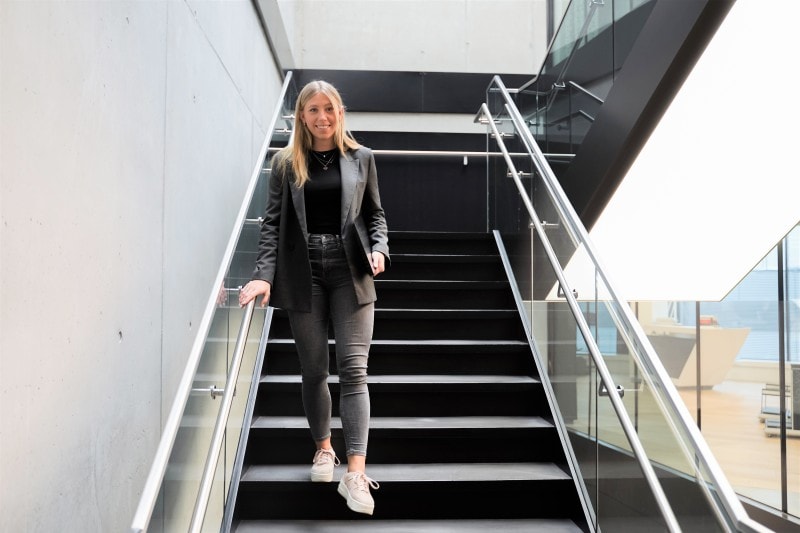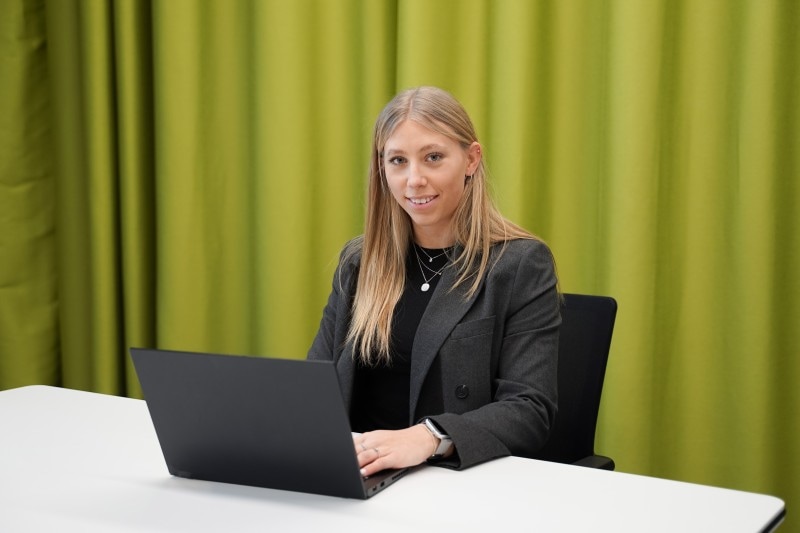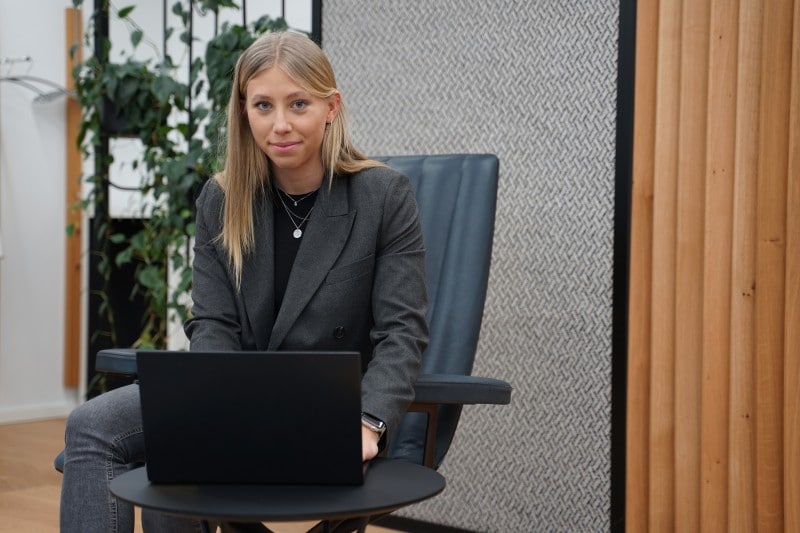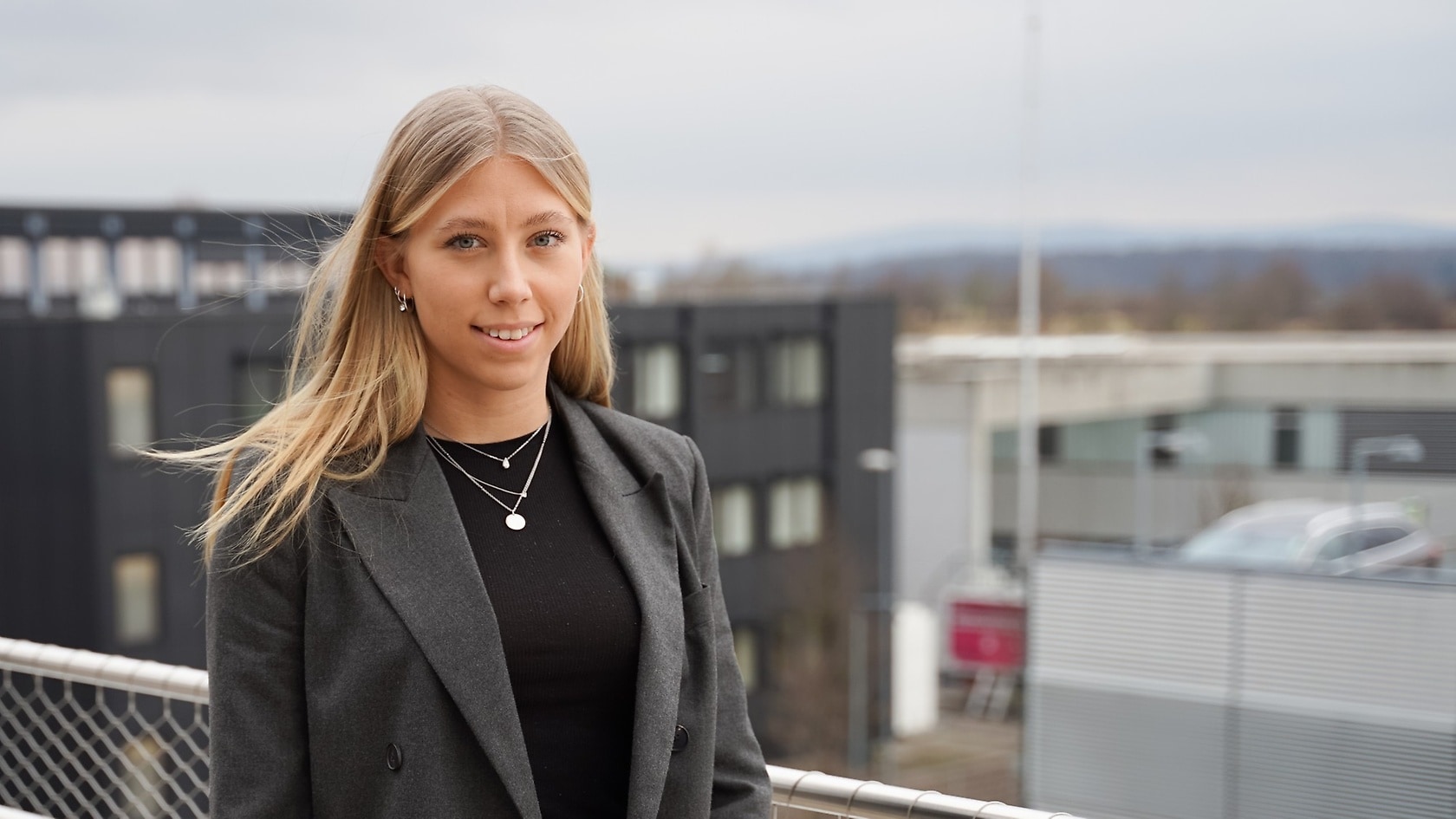From the seminar to the battery cell lab.
Researching battery systems of the future during your studies and help designing new vehicle models yourself: this is what Alina Schönleber is experiencing in her dual study programme in mechatronics, automotive systems technology and electric mobility at Mercedes-Benz in Sindelfingen. In her interview, the 20-year-old talks about the highlights of working in the innovation cell lab, model robots and the wide-ranging support that is provided.
Alina, what has been the highlight of your time so far as a student on a dual programme at Mercedes-Benz?
Definitely my second work placement. I was working at the Mercedes-Benz Innovation Cell Laboratory in Nabern. Colleagues there are researching completely new battery systems, which is one of the most important topics as far as e-mobility is concerned. My supervisor came up with a theory for reducing heat generation in battery cells, and I worked with the team to test whether the theory could be put into practice. I learned an incredible amount in the process: for example about how to conduct experiments on a battery cell and link the measurement results with theory.

So you like to be right in the middle of the action?
Yes, that's why I decided to do a dual study programme at Mercedes-Benz. In physics or chemistry lessons at school, I had already established that I understand the theory better when I try it out myself in an experiment. In my work placement phases, I can apply the knowledge from university directly - and learn a lot. I chose the bachelor's degree in mechatronics, because that way I learn the most important things from three separate areas: mechanics, electrical engineering and computer science. This overarching approach was important for me.
Why did you want to join Mercedes-Benz?
Because of the cool and luxurious cars, of course (laughs). Actually, Mercedes-Benz has always been part of my life: I come from a town near Pforzheim and the Group is an important employer in the region. During my time at school, I did a work placement in the mechatronics training unit at the Sindelfingen plant. I was totally impressed by that. For example, we removed and installed brake discs and doors, or had a closer look at engines. I found the work and the atmosphere really great. And the students on the dual programme there often raved about how much they enjoyed working at Mercedes-Benz . That is why I applied here straight after finishing school.

And how did it all start for you at Mercedes-Benz?
I started the introductory phase at Mercedes-Benz in October 2019 with 21 fellow students. That was a really nice time. We got to know each other and completed a wide variety of training courses. We went to the workshop and designed and built a model robot together. This first phase went on until Christmas and we grew close as a group. After our first introductory practical phase came the first university phase, at the Baden Württemberg Cooperative State University (DHBW) campus in Horb.
Where did you work during your first practical phase?
I wanted to begin by getting an overview of all the systems in a vehicle, so I chose the bodywork team in the overall vehicle testing department in Sindelfingen, where I shared responsibility for the benchmarking of a new compact car model. As part of this, I investigated the door handles and door opening systems, for example. My results then contributed to the development of our new vehicle models. It's a great feeling when your own work is so important and you can help shape the future, so to speak.
Do you already know what you want to do after your studies?
I was just so inspired by everything I was able to learn and experience in the innovation cell lab: I definitely want to work in the area of electric mobility after graduation. Incidentally, that is what is so great about the dual study programme at Mercedes-Benz. We are free in our choice of topics, taking into account the DHBW's training framework, and the diverse insights allow us to discover new things and develop our own new interests.

And what are the university phases like?
The practical assignments are often demanding, but I think that's a good thing. At university we learn very important basics. Of course, you need a bit of discipline, especially during the exam phases. Mercedes-Benz supports us in this: all first-year students are assigned a mentor from higher year groups. They are always there for us if we have questions and give us the occasional useful tip - that's a huge help. In addition, of course, there is our supervisor for the practical work, who even visits us on campus to motivate us for the exams. All the support is absolutely invaluable.
Do you have any tips for pupils who are considering a dual study programme at Mercedes-Benz?
I think it's important above all to talk to people: at training fairs, on DHBW information days, with Mercedes-Benz employees. Of course there is also a lot of information on the careers website. The corporate culture at Mercedes-Benz is really great. The other students and colleagues are very open and helpful. They are always happy to answer questions and help. And, by the way, there are also opportunities to do practical work assignments abroad.
Alina Schönleber (20) owes her fascination for cars to her father: when she was growing up, the quality management engineer at Mercedes-Benz used to take test drives in new models with the family at weekends. With the support for gifted students that is provided by the STEM-oriented Hector Seminar, Alina started deepening her passion for technology from the age of 12 and completed her school leaving examination at the Kepler Gymnasium in Pforzheim in 2019. When the keen cake-baker is not giving her all to her bachelor's degree in mechatronics, automotive systems technology and electric mobility, she coaches 10- and 11-year-olds at the local athletics club, trains for important competitions herself and is involved in the volunteer fire brigade - she has just passed her respiratory protection training.




